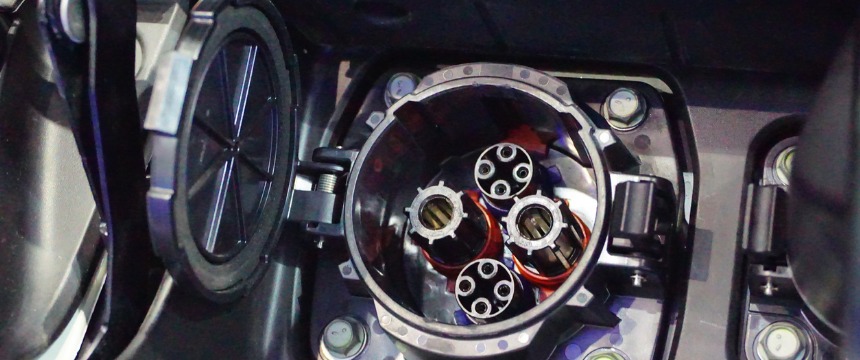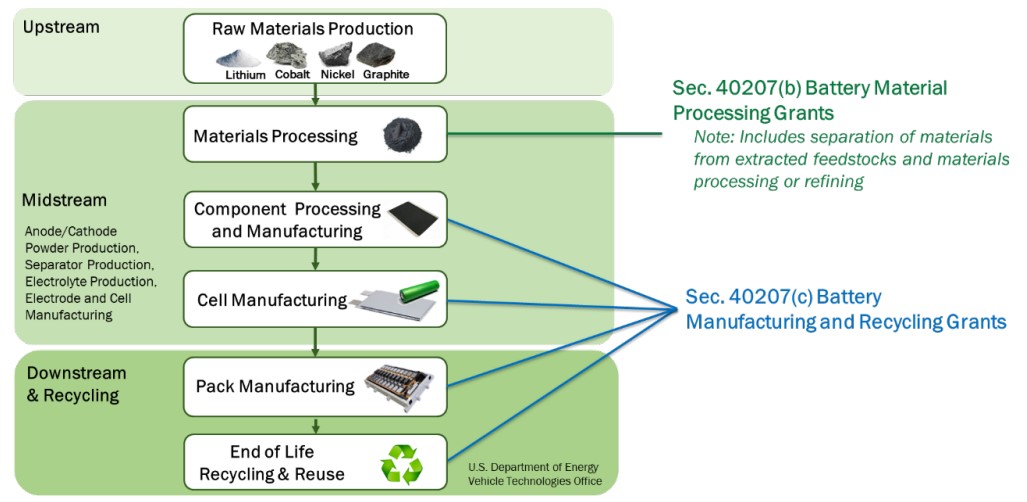DOE Announces Over $3 Billion in Funding Opportunities to Support U.S. Battery Supply Chain Buildout

On May 2, 2022, The U.S. Department of Energy (“DOE) issued through its Office of Manufacturing and Energy Supply Chains (“MESC”) and Office of Energy Efficiency and Renewable Energy (“EERE”) Funding Opportunity Announcement (“FOA”) No. DE-FOA-0002678 directing $3.1 billion from the Infrastructure Investment and Jobs Act (“IIJA”) to support a domestic battery supply chain, specifically, “new, retrofitted, and expanded commercial facilities as well as manufacturing demonstrations and battery recycling.” A separate FOA was also announced providing an additional $60 million for “second-life applications for batteries once used to power EVs, as well as new processes for recycling materials back into the battery supply chain.”
DOE’s announcement described both FOAs as “key components of the Administration’s whole-of-government supply chain strategy to strengthen America’s energy independence to reduce our reliance on competing nations and support the President’s goal to have electric vehicles make up half of all vehicles sales in America by 2030.”
Under the $3.1 billion FOA, DOE anticipates 17-34 awards between $50 million and $400 million.
the $3.1 billion FOA, DOE anticipates 17-34 awards between $50 million and $400 million.
The FOA organizes 12 specific areas of interest into two broad grant categories:
- Battery Material Processing
- Battery Component Manufacturing and Recycling
Applicants are required to submit a Letter of Intent by May 27, with a full Application Submission Deadline of July 1, 2022.
The separate $60 million recycling FOA requires submission of Concept Papers by May 31 and a full Application Submission by July 19, 2022.
DOE noted that the IIJA authorized more than $7 billion to strengthen the U.S. battery supply chain, from raw materials to domestic manufacturing, along with other funds set aside for more downstream battery storage deployment and EV charging infrastructure.
This week’s funding opportunities come on the heels of a diverse array of Executive Branch actions to spur domestic investment in U.S. battery storage technologies for electric vehicles and stationary energy storage.
On April 18, the DOE’s Loan Guarantee Program announced a conditional commitment to lend up to $107 million to Syrah Technologies, LLC to expand its facility in Vidalia, Louisiana to ramp up production of natural graphite-based active anode material (AAM) for electric vehicles. If the loan closes, it will be the first Advanced Technology Vehicles Manufacturing (ATVM) program loan in over 10 years and the first loan to an upstream supply chain entity rather than an electric vehicle manufacturer.
In late March, President Biden invoked the Defense Production Act with respect to raw materials for large-capacity batteries, including lithium, nickel, cobalt, graphite, and manganese. The invocation requires the U.S. Department of Defense to support feasibility studies to support the securing of a domestic supply of such materials through “environmentally responsible domestic mining and processing; recycling and reuse; and recovery from unconventional and secondary sources, such as mine waste.” Read Lauren Loew’s coverage of rising lithium prices and the dearth of U.S. capacity.
Foley is continuing to follow developments in this area. The Foley team has significant experience, knowledge and expertise related to the battery and storage industry, including the automotive, manufacturing, supply chain, regulatory, IP, private equity, tax equity, project finance, and public-private financing issues related to the same, and we are ready to help clients navigate this evolving landscape.





